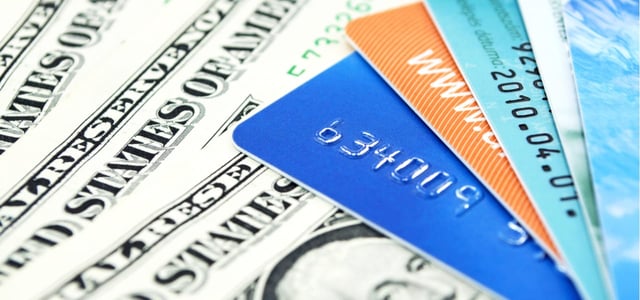Consumers love credit cards. In fact, this popular payment method accounted for 38% of point-of-sale transactions in 2020, compared to 29% made with debit cards and just 12% made with cash, according to a report from Statista.
Among those shoppers who prefer to pay by plastic, store credit cards are often included in the mix.
Retail credit cards are hard for consumers to pass up, especially when store associates tempt them with a bonus discount on the first purchase just for signing up. This is why 62% of consumers surveyed have applied for retail credit cards at some point, and 69% of those who have applied said they did so on a whim at checkout at least once, as reported by CreditCards.com.
But just as with bank credit cards, store credit cards have pros and cons you should consider to ensure the card meets your personal and financial needs. Here’s a look at both sides to help you figure out what’s best for you.
5 Pros of Store Credit
Let’s begin with the positives of store credit:
1. Sign Up Discount
Retailers know that shoppers have a hard time passing up a deal, and they entice them to open a store credit card by offering a promotional discount just for signing up. Such savings vary from store to store, averaging between 10% to 20% on the first transaction.
However, some stores offer an even greater discount to attract new cardholders. For instance, Kohl’s promises to take an additional 35% off the first purchase using its credit card.
Though opening a new credit card just to get a discount is ill-advised, there are some scenarios in which it can be beneficial to your budget. If you’re planning to buy an expensive item, such as a new couch or big-screen TV, taking advantage of the new card discount can provide significant savings.

It may make sense to open a store card for the discount if you’re making a significant purchase, such as a new television.
In these rare instances, it may be a smart move to open a new store card as long as you manage your account carefully by paying off the balance in full and on time to avoid interest charges.
2. Lenient Approval Terms
Store credit cards make it easy for most customers to open a credit card by offering lenient approval requirements. Considering most store cards are only valid for use at the specific brand or family of stores, there’s less risk to the lender, making this a viable option for those with less-than-stellar credit who would otherwise have trouble getting approved for a general-use credit card.
Store cards provide consumers with poor credit an opportunity to build or rebuild their credit using this new line of credit.
Before applying, inquire about the store’s approval requirements so you don’t run the risk of denial. Every time a hard inquiry is made on your credit report, such as when applying for a new store card, your score may drop by five to 10 points, so it’s something to keep in mind.
3. Robust Brand Rewards
If you shop at a specific retailer often — say, you purchase your kid’s clothing at Old Navy, for example — then opening a credit card for that store can be beneficial since you can use any rewards earned to offset future purchases. The brand rewards offered by store cards are typically much higher than those available through general-purpose cards.

Cardholders often earn more robust rewards for their patronage.
For instance, the GAP credit card offers five points per $1 spent both in-store and online at GAP Inc. stores, which include GAP, Banana Republic, Old Navy, and Athleta. Plus, cardholders get access to double-point days that provide an even higher reward earning potential.
4. Exclusive Cardholder Perks
Not only does opening a store card get you a one-time-use discount off your first purchase and the opportunity to earn valuable rewards, but you will also be privy to several other perks that can include free shipping, exclusive coupons, early access to sales and promotional events, and much more.
For instance, Macy’s cardholders get free shipping with no minimum purchase, 25% off any day with Star Passes, bonus reward days, and even a birthday surprise deal. And Nordstrom credit card members get early access to their Anniversary Sale, free trunk styling, and alterations benefits.
Some store cards reward their biggest spenders with even more benefits. For instance, Banana Republic cardholders who earn 5,000 points in a calendar year will be granted Luxe Status, which provides even more perks. These include free shipping on all online orders at all GAP Inc. stores, 20% bonus points each quarter, free basic alterations on Banana Republic purchases, and even a “Choose Your Own Sale Day.”
5. No Annual Fees
Though store cards aren’t completely fee-free, one area where they shine is that they typically don’t charge annual fees.

Reports show that 99% of store credit cards do not charge an annual fee.
Some 99% of store-branded credit cards do not charge an annual fee, according to WalletHub’s 2021 Store Card Landscape. In comparison, the average general-purpose card comes with an annual fee of $19 per year.
5 Cons of Store Credit
And now for the not-so-great features of store credit:
1. High APRs
With lenient approval terms come high interest rates, which explains why store cards are among those with the highest APRs. Store cards for Big Lots, Discount Tire, and Kay Jewelers charge among the highest interest rates at a whopping 29.9%, according to CreditCards.com.
If you’re planning to open a store card, review the interest rate and terms before applying, and always pay off the balance in full before the due date to avoid unnecessary finance fees.
2. Low Credit Limits
Store credit cards typically come with low credit limits. While this may seem like a good way to control your spending, it can backfire by hampering your credit score.
Offering low credit limits offsets the risk to the lender. But if you tend to keep a high credit balance, a low credit limit can increase your credit utilization rate — the amount of credit you’re using relative to your available credit.

Store credit cards generally come with low credit limits, which can make it easy to rack up a high credit utilization ratio.
Since credit utilization rates over 30% are not favorable, your credit score will be negatively affected as your balance reaches that threshold or surpasses it — something that can easily and quickly happen with a low credit limit. This means you will have to minimize purchases or pay off any balance you rack up immediately.
3. Restricted Usage Options
Store cards aren’t beneficial outside of the particular retailer that issued the line of credit. This is referred to as closed-loop credit. So, if you need to pay for something that’s sold at another store or business, you better have another card or cash handy.
Though some credit cards can be used at multiple retailers operated under the same brand, like the Banana Republic card from GAP Inc., usage options are still very limited, and you should consider this before opening any store card.
4. Limited Reward Redemption
Though earning store rewards for use on future purchases is a great way to save money when shopping, the reality is that such reward redemption is fairly limited and can actually promote extra spending.
For instance, receiving a reward certificate to spend at Old Navy or Gap after you have already purchased clothing for the upcoming season may trigger you to make a few unnecessary purchases. And, if the purchase amount exceeds the reward value, you are likely to spend more out of pocket.

Your rewards are limited to discounts on future purchases with the store or its family of brands and usually expire within a certain period, unlike traditional cash back or points.
Consider how flexibility in redemption can help you reach various goals faster. Bank credit cards, for example, offer a variety of reward options, from cash back that can be either applied as a statement credit or put into a savings account to miles or points that can go toward free travel.
5. Deferred Interest Penalty
In addition to the discount promised upon opening a store card, you may also get excited about the interest-free promotion for the first few months after account opening. Just make sure you read the fine print and don’t assume you’re completely off the hook from paying any finance charges.
Rather than waive interest, most store cards defer it for a certain period — typically for 12 to 18 months from when you first get your card. Once that grace period is up, you will be charged interest on the full balance from the date of your initial transaction regardless of how much you owe when that promotional period is up — even if it’s just $1.
Deferred interest can be confusing and can catch many store cardholders off guard. In fact, a 2021 study from WalletHub found that 52% of consumers don’t know how deferred interest works.
The best way to understand this misleading promotion is to read the fine print and terms before signing up. Keeping a low balance and setting up automatic payments for your full account balance every month can also help you avoid paying high interest fees.
Don’t Apply For Store Credit On a Whim
Before you open a store credit card, consider your spending habits and how you want to earn and use rewards. Though there are plenty of pros and cons to store cards, it comes down to personal needs and preferences. Do your homework and research store card details before applying to ensure whatever option you’re considering is a good fit for you.
If you’re interested in securing a card that offers maximum rewards, consider registering with GigaPoints.com. This tool analyzes your spending habits to help you find the best rewards credit card that will give you even more back for the types of purchases you make.
Advertiser Disclosure
CardRates.com is a free online resource that offers valuable content and comparison services to users. To keep this resource 100% free, we receive compensation for referrals for many of the offers listed on the site. Along with key review factors, this compensation may impact how and where products appear across CardRates.com (including, for example, the order in which they appear). CardRates.com does not include the entire universe of available offers. Editorial opinions expressed on the site are strictly our own and are not provided, endorsed, or approved by advertisers.




![6 Pros & Cons of Owning a Credit Card ([updated_month_year]) 6 Pros & Cons of Owning a Credit Card ([updated_month_year])](https://www.cardrates.com/images/uploads/2017/12/procon.png?width=158&height=120&fit=crop)
![7 Easy-to-Get Store Credit Cards for Bad Credit ([updated_month_year]) 7 Easy-to-Get Store Credit Cards for Bad Credit ([updated_month_year])](https://www.cardrates.com/images/uploads/2017/12/storecards-2--1.png?width=158&height=120&fit=crop)
![9 Comenity Bank Store Card Alternatives ([updated_month_year]) 9 Comenity Bank Store Card Alternatives ([updated_month_year])](https://www.cardrates.com/images/uploads/2019/11/Comenity-Bank-Store-Card-Alternatives--1.jpg?width=158&height=120&fit=crop)
![7 Best Credit Cards for Buying Gift Cards ([updated_month_year]) 7 Best Credit Cards for Buying Gift Cards ([updated_month_year])](https://www.cardrates.com/images/uploads/2019/11/Best-Credit-Cards-for-Buying-Gift-Cards-Feat.jpg?width=158&height=120&fit=crop)
![7 Best Credit Cards Accepted at Costco ([updated_month_year]) 7 Best Credit Cards Accepted at Costco ([updated_month_year])](https://www.cardrates.com/images/uploads/2018/05/costco--1.png?width=158&height=120&fit=crop)
![5 Facts About the Shopping Cart Trick for Credit Cards ([updated_month_year]) 5 Facts About the Shopping Cart Trick for Credit Cards ([updated_month_year])](https://www.cardrates.com/images/uploads/2018/07/carttrick.png?width=158&height=120&fit=crop)
![5 High Credit Line Credit Cards for Fair Credit ([updated_month_year]) 5 High Credit Line Credit Cards for Fair Credit ([updated_month_year])](https://www.cardrates.com/images/uploads/2021/07/High-Credit-Line-Credit-Cards-For-Fair-Credit.jpg?width=158&height=120&fit=crop)
![11 Best Credit-Building Credit Cards ([updated_month_year]) 11 Best Credit-Building Credit Cards ([updated_month_year])](https://www.cardrates.com/images/uploads/2018/06/build.png?width=158&height=120&fit=crop)